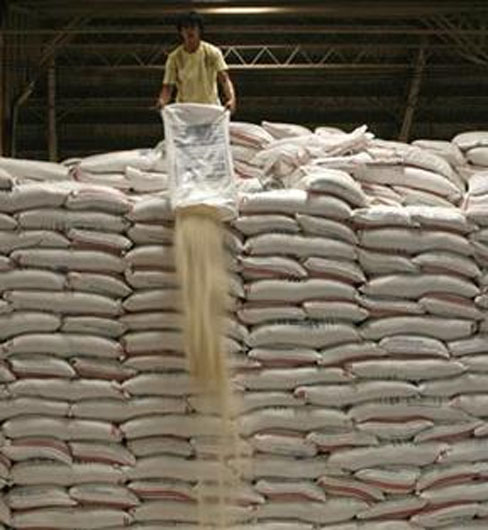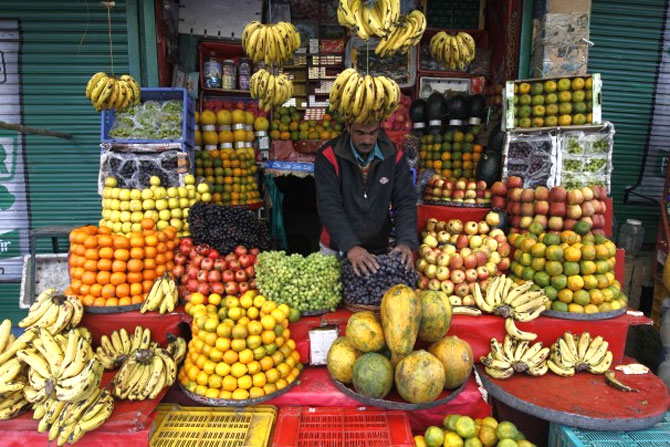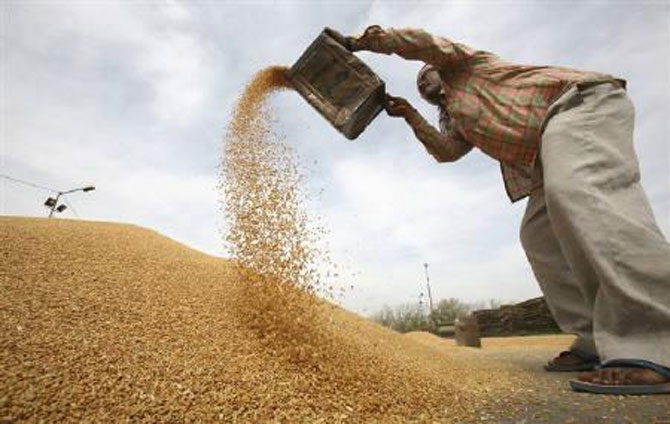Photographs: Cheryl Ravelo/Reuters Business Standard
The blame for the relentless ascent rests largely with the misguided agricultural marketing policies of the Centre and state governments.
Both the inflation figures for November and current market reports indicate that the contours of food inflation have changed tangibly of late.
While the prices of pulses, edible oils and sugar have tended to either moderate or decline, those of staple cereals, notably rice and wheat, and of perishable items, chiefly vegetables and fruits, continue to propel food inflation higher. The blame for this relentless ascent rests largely with the misguided agricultural marketing policies of the Centre and state governments.
The Centre is at fault for persisting with its ill-advised open-ended procurement-based food management system, which is driving up prices by constraining grain supplies in the market.
The states, on the other hand, are guilty of not suitably reforming their agricultural produce marketing committee (APMC) laws to cut down unduly high marketing costs. Well-conceived action on both these counts can have a moderating effect on the overall food inflation.
Click on NEXT for more...
The only way to fix food inflation
Photographs: Fayaz Kabli/Reuters
Significantly, even the government’s own advisory body on food grain policy, the Commission for Agricultural Costs and Prices (CACP), is averse to open-ended procurement of rice and wheat.
Such procurement, coupled with misplaced stockholding caps on various farm commodities, is discouraging private trade from playing its due role in the food grain business.
The official agencies normally mop up 90 per cent of rice and wheat arriving in the mandis of states such as Punjab, Haryana, Madhya Pradesh, Chhattisgarh and Andhra Pradesh.
As a result, the government has become the biggest hoarder of food grain. The CACP has called this a de facto takeover of the grain trade.
Unsurprisingly, therefore, it has called upon the Competition Commission of India (CCI) to look into such monopolisation of the grain trade by the government. The objective of government procurement should be to provide price support to farmers and not to strangulate the market.
Click on NEXT for more...
The only way to fix food inflation
Photographs: Reuters
The CACP rightly feels that the easiest way to bring down cereal prices is to offload surplus stocks in the domestic or export markets.
The danger that a sizable part of this grain would land back in the government’s kitty through procurement can be staved off by selling it at prices equal to or higher than the minimum support prices but lower than the market rates.
By doing so, the government will save on the stock-carrying cost and reduce food subsidy, besides softening market prices.
Click on NEXT for more...
The only way to fix food inflation
Photographs: Rupak De Chowdhuri/Reuters
In the case of vegetables and fruits, a major cause for high prices is the multiplicity of intermediaries between the producer and the consumer as well as high transaction costs at APMC mandis.
Apart from other state levies, the charges of the arhatiyas, or commission agents, alone amount to some six per cent in Delhi’s Azadpur market and eight per cent in Mumbai’s Vashi market.
These costs ultimately add up to between 10 and 14 per cent in different APMC markets. For food grain, the official mandi charges alone amount to 14.5 per cent in Punjab and more than 11.5 per cent in Haryana, the two key contributors of rice and wheat to the central grain pool.
Doing away with these costs and the unduly high margins of multiple middlemen by allowing direct sale by farmers to retailers or consumers would make vegetables and fruits far cheaper.
Thus, the ball is clearly in the government’s court. Fundamental changes in food management policies, coupled with wide-ranging market reforms, are the need of the hour.






article